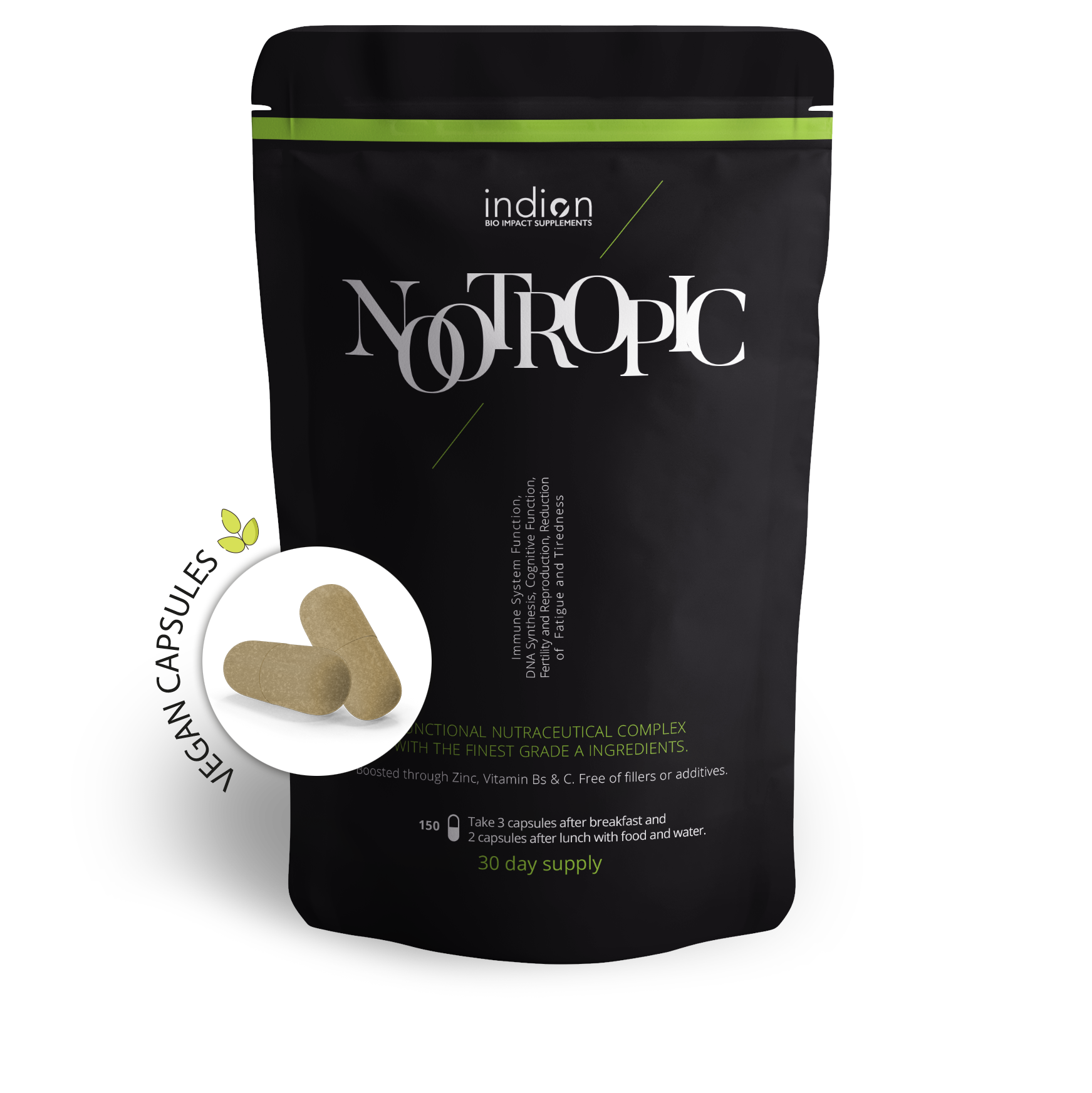Ashwagandha, also known as Withania somnifera, is a herb that belongs to the nightshade family. It is extensively used in Ayurvedic medicine for its health-promoting properties.
The name “ashwagandha” is derived from Sanskrit, with “ashwa” meaning horse and “gandha” meaning smell. This refers to the strong odor of fresh roots which resembles that of a horse.
Definition of Ashwagandha
Ashwagandha is a small shrub with yellow flowers and red fruit. The root extract of this plant has been used as traditional medicine in India for more than 3,000 years.
It contains a variety of active compounds such as alkaloids, flavonoids, and steroidal lactones known as withanolides. The active ingredients in ashwagandha have been studied for their potential health benefits including reducing stress and anxiety levels, improving cognitive function, and supporting immune system function.
Brief history of Ashwagandha
Ashwagandha has been used in traditional Ayurvedic medicine for over 3,000 years to treat various ailments including stress-related conditions such as anxiety and insomnia. The herb has also been used to improve strength and vitality in both men and women.
In ancient times, ashwagandha was considered a rejuvenating tonic for the body and mind. It was believed that consuming ashwagandha could enhance physical performance, increase endurance levels during exercise and promote overall wellbeing.
Importance of Ashwagandha in Ayurvedic medicine
Ayurvedic medicine is one of the oldest forms of holistic healing practices originated from India over 5,000 years ago. It is based on the belief that health and wellness depend on a delicate balance between the mind, body and spirit.
Ashwagandha has a special significance in Ayurvedic medicine due to its adaptogenic properties. Adaptogens are substances that help the body cope with physical and emotional stress by reducing cortisol levels, improving immune system function, and promoting overall balance in the body.
In Ayurvedic medicine, ashwagandha is often recommended as a general tonic to promote overall health and well-being. It is also used to treat specific conditions such as insomnia, anxiety, depression, arthritis and gastrointestinal disorders.
Health Benefits of Ashwagandha
Ashwagandha is a powerful adaptogen that has been used for centuries to promote overall health and well-being. The herb is known for its ability to help the body cope with stress, anxiety, and other psychological conditions.
Ashwagandha is also highly effective at enhancing cognitive function and memory, as well as reducing inflammation in the body. In this section, we will explore the many health benefits of ashwagandha.
Stress and Anxiety Reduction
Ashwagandha contains compounds called withanolides that have been shown to reduce stress and anxiety levels in the body. These compounds work by modulating the activity of neurotransmitters that are responsible for mood regulation, such as serotonin, dopamine, and norepinephrine. Studies have found that ashwagandha supplementation can reduce cortisol levels by up to 30%, which is a significant marker of stress reduction.
In one study conducted in India, participants who took ashwagandha supplements reported a 69% reduction in anxiety and insomnia symptoms compared to the placebo group. Another clinical study also found that taking ashwagandha supplements for six weeks reduced anxiety levels by 56% compared to placebo.
Improved Cognitive Function and Memory
Ashwagandha has been shown to enhance cognitive function and memory in several ways. First, it helps increase blood flow to the brain, which can improve cognitive performance. Second, it contains compounds that protect brain cells from oxidative damage caused by free radicals.
In one study conducted on adults with mild cognitive impairment (MCI), those who received a high concentration ashwagandha extract improved their scores on memory tests compared to those who received a placebo supplement. Another study showed improvement in reaction time, cognitive tasks and attention among individuals who took the ashwagandha extract supplements for eight weeks.
Anti-inflammatory Properties
Ashwagandha has potent anti-inflammatory properties that have been shown to reduce inflammation in the body. Chronic inflammation is associated with several conditions such as heart disease, arthritis, and diabetes. The herb contains steroidal lactones called withanolides that inhibit the activity of pro-inflammatory cytokines, which are molecules responsible for promoting inflammation in the body.
In a study conducted on osteoarthritis patients, those who received ashwagandha supplementation had a significant reduction in pain and stiffness compared to those who received a placebo supplement. In another study conducted on individuals with rheumatoid arthritis, taking ashwagandha supplements for four weeks reduced inflammation markers by 36% compared to placebo.
Immune System Support
The immune system plays a vital role in protecting the body against infections and diseases. Ashwagandha has been shown to enhance immune system function by increasing the activity of natural killer cells and macrophages – types of white blood cells that help fight off infections.
In one study conducted on healthy adults, those who took ashwagandha supplements for eight weeks had an increase in their white blood cell counts compared to placebo. Another study showed that ashwagandha supplementation increased natural killer cell activity by up to 50%.
Improved Sleep Quality
Ashwagandha has been used traditionally as a sleep aid due to its calming effects on the nervous system. The herb contains compounds that promote relaxation and can reduce stress and anxiety levels, which can help improve sleep quality.
One study found that participants who took ashwagandha supplements reported improved sleep quality compared to those who received a placebo supplement. Another study conducted on individuals with insomnia showed that ashwagandha supplementation improved sleep onset latency and total sleep time compared to placebo.
Lowered Cholesterol Levels
Ashwagandha has been shown to reduce cholesterol levels in several studies. High cholesterol levels are associated with an increased risk of heart disease and other cardiovascular conditions.
In one study conducted on rats, ashwagandha supplementation reduced total cholesterol levels by 53% and triglyceride levels by 45%. Another study conducted on adults with high cholesterol levels showed that taking ashwagandha supplements for eight weeks reduced total cholesterol levels by 10% compared to placebo.
Ashwagandha is a powerful adaptogen that offers several health benefits such as stress reduction, improved cognitive function and memory, anti-inflammatory properties, immune system support, improved sleep quality and lowered cholesterol levels. Supplementing with ashwagandha may be an effective way to promote overall health and well-being naturally.
NOOTROPIC BLEND
Mental peak performance on demand
The NOOTROPIC BLEND is a complex that helps you to get "in the zone", by boosting concentration, attentiveness, and responsiveness through the utilization of some of the most powerful nootropic ingredients available.
- Mind booster for more creativity
- Promotes concentration and focus
- For sustained performance
- Antioxidants protect the brain
- 2 capsules daily, 30 minutes before work, competition, exam or training
How Ashwagandha Works in the Body
Ashwagandha is an adaptogenic herb, which means it helps the body adapt to stressors and maintain optimal balance. The active components of ashwagandha are called withanolides. These compounds have been shown to modulate several pathways in the body, including the hypothalamic-pituitary-adrenal (HPA) axis, the immune system, and neurotransmitter levels.
Adaptogenic Properties
One of ashwagandha’s most notable properties is its adaptogenic effect on the body. Adaptogens help regulate the HPA axis, which controls our response to stress.
When we experience stress, our adrenal glands release cortisol into our bloodstream. Chronically elevated cortisol levels can lead to numerous health problems such as weight gain, poor sleep quality, anxiety and depression.
Studies have shown that ashwagandha can help reduce cortisol levels by up to 30%. This reduction in cortisol levels promotes a more relaxed state in the body and helps mitigate some of the negative effects of chronic stress.
Effects on Nervous System
Ashwagandha has also been found to have a positive effect on brain function and may improve cognitive performance. Research suggests that it may improve memory, attention span, and reaction time.
The herb anxiety ashwagandha also has anxiolytic effects by reducing anxiety symptoms such as nervousness and restlessness. In one study involving 64 subjects with chronic stress symptoms, those given ashwagandha experienced significant reductions in anxiety scores compared to those given a placebo.
Effects on Cortisol Levels
Cortisol is a hormone produced by your adrenal glands that plays an important role in regulating blood sugar levels, blood pressure and immune function. High cortisol levels can lead to weight gain around your midsection, sleep disturbances and increased inflammation.
Ashwagandha has been shown to reduce cortisol levels in several studies. In one study, participants taking ashwagandha had a significant reduction in cortisol levels compared to those given a placebo.
Another study found that individuals who took ashwagandha supplements had lower cortisol levels than those who did not take the supplement. Ashwagandha works in the body by modulating various physiological pathways, including stress response, immune function and neurotransmitter balance.
Physical and mental health
Ashwagandha root, commonly known as Indian ginseng, has been used in traditional herbal medicines for centuries, particularly in Ayurveda integrative medicine. This powerful herb is derived from the ashwagandha root extract, which is believed to possess numerous physical and mental health benefits.
One of the primary advantages of ashwagandha is its ability to alleviate stress-related disorders, as evidenced by various placebo-controlled studies and clinical trials. Its adaptogenic properties support the brain and central nervous system, enabling the body to better cope with external stressors. Furthermore, ashwagandha has been found to improve energy levels and boost testosterone levels, which can lead to enhanced sexual function.
Joint pain and inflammation, commonly experienced by rheumatoid arthritis patients, may also be alleviated by ashwagandha root. In a study published in the Indian J Pharmacol, an ashwagandha root extract demonstrated anti-inflammatory and analgesic properties that helped reduce joint pain and discomfort. Additionally, ashwagandha’s potential to increase insulin sensitivity and regulate blood sugar levels make it an appealing treatment option for those with diabetes.
Animal studies have shown that ashwagandha may also have neuroprotective effects, which could be beneficial in the treatment of neurodegenerative diseases such as Alzheimer’s disease. Research published in the Journal of Ayurveda Integrative Medicine (J Ayurveda Integr Med) and the Journal of Alternative and Complementary Medicine (J Altern Complement Med) further supports ashwagandha’s potential in combating cognitive decline and improving memory function.
However, individuals should exercise caution when using herbal supplements like ashwagandha, as adverse reactions may occur in certain cases. For example, ashwagandha may not be suitable for individuals with hormone-sensitive prostate cancer, bipolar disorder, or those taking specific diabetes medications.
Ashwagandha can be found in various forms, such as ashwagandha tea, capsules, and powder, at health food stores and online retailers. It is crucial to consult a healthcare professional before starting ashwagandha treatment, as the herb can interact with certain medications and may not be suitable for everyone.
In conclusion, ashwagandha is a powerful herbal medicine that has been used for centuries to promote physical and mental well-being. With its adaptogenic properties, anti-inflammatory effects, and potential neuroprotective benefits, ashwagandha is a promising natural treatment option for various health conditions. However, it is essential to consult a healthcare professional before incorporating this ayurvedic treatment into your daily routine.
Its adaptogenic properties make it effective for reducing stress and anxiety symptoms while also improving cognitive function. Additionally, its ability to reduce cortisol levels makes it a promising treatment option for individuals with chronically elevated cortisol levels.
Different Forms of Ashwagandha Supplements
Powder Form
One of the most popular and versatile forms of ashwagandha supplements is the powder form. This form can be easily mixed into foods, smoothies, or drinks for easy consumption. The powder form is made by grinding the roots and leaves of the ashwagandha plant into a fine powder.
When buying organic ashwagandha powder, it’s important to choose a high-quality brand that uses pure, organic ingredients. Some unreliable brands may mix in other powders or additives that can decrease the effectiveness of the product.
It’s also important to note that ashwagandha powder has a slightly bitter and earthy taste. It’s recommended to start with small doses and gradually increase as your body gets used to it.
Capsule Form
For those who prefer an easier way to consume ashwagandha, capsules are a great option. Ashwagandha capsules are made by filling vegetable capsules with powdered or extract forms of ashwagandha. Capsules are convenient because they offer precise dosages and can be easily taken on-the-go without any mess or fuss.
However, one downside is that they may not absorb as quickly into your system compared to other forms like tinctures. When buying ashwagandha capsules, it’s important to choose a reputable brand that uses pure ingredients without any fillers or additives.
Tincture Form
Ashwagandha tinctures are another way to consume this powerful herb. Tinctures of ashwagandha benefits are made by steeping the root and leaves of the plant in alcohol for several weeks before straining out the liquid extract.
Tinctures usually come with droppers for precise dosing and can be easily added to water or juice. They are also easy to absorb into the body and may work faster than other forms.
However, it’s important to note that ashwagandha tinctures contain alcohol and may not be suitable for individuals who are sensitive or allergic. It’s also important to choose a brand that uses high-quality ingredients and follows proper extraction methods.
How to take Ashwagandha Supplements?
Ashwagandha comes in various forms such as powder, capsules, and tinctures. The recommended dosage of ashwagandha supplements depends on factors like age, health status, and the reason for supplementing.
The most common method of taking ashwagandha is through capsules. When purchasing ashwagandha supplements, it is essential to read the label carefully and follow the instructions provided by the manufacturer.
In general, the recommended daily dosage ranges from 300mg – 500mg per day for a healthy individual. However, if you are looking to supplement for a particular health condition like anxiety or stress reduction or improving cognitive function and memory retention, you should consult with a healthcare professional before starting.
NOOTROPIC BLEND
Mental peak performance on demand
The NOOTROPIC BLEND is a complex that helps you to get "in the zone", by boosting concentration, attentiveness, and responsiveness through the utilization of some of the most powerful nootropic ingredients available.
- Mind booster for more creativity
- Promotes concentration and focus
- For sustained performance
- Antioxidants protect the brain
- 2 capsules daily, 30 minutes before work, competition, exam or training
Dosage Recommendations Based on Age & Health Status
The dosage recommendations for ashwagandha supplements vary based on age and health status. For example:
- Adults: The recommended daily dose is between 300-500mg.
- Children: Ashwagandha supplements are not recommended for children under the age of 18 years.
- Pregnant Women: Pregnant women should avoid using ashwagandha supplements without consulting their physician.
- Breastfeeding Women: It is still unclear whether ashwagandha passes onto breastmilk; therefore, breastfeeding women should avoid using these supplements unless directed otherwise by their physician.
How to Incorporate Ashwagandha into Your Daily Routine
There are several ways you can incorporate ashwagandha into your daily routine:
1. Capsules – As mentioned earlier, capsules are a common form of consuming ashwagandha.
They can be taken orally with water after meals. 2. Powder – Ashwagandha powder can be mixed with warm milk or water to make a tea.
It can also be added to smoothies and other beverages. 3. Tincture – Tinctures are highly concentrated liquid extracts that can be added to water or other beverages.
They are easy to take but require a more precise dosage. It is essential to be consistent with ashwagandha supplementation for the best results.
It is recommended that you take ashwagandha supplements daily for at least six weeks to experience the full benefits of this herb. Additionally, it is always best to consult with a healthcare professional before starting any new supplement regimen, especially if you have underlying health issues or are taking medications that may interact with ashwagandha supplements.
SIDE EFFECTS AND PRECAUTIONS ASSOCIATED WITH ASHWAGANDHA USE
While ashwagandha is generally safe for most people, there are some potential side effects and precautions to be aware of when taking this herb. Some of the common side effects that have been reported include upset stomach, diarrhea, and vomiting. These symptoms are typically mild and go away on their own after a few days.
However, there have been rare reports of more serious side effects such as liver toxicity, so it is important to take ashwagandha supplements under the guidance of a healthcare professional. Additionally, pregnant women should avoid taking ashwagandha because it may stimulate uterine contractions that could cause miscarriage.
Similarly, breastfeeding women should avoid using ashwagandha as there is not enough evidence to determine its safety in infants. People with autoimmune diseases should also use caution when taking this herb as it may stimulate the immune system which could worsen symptoms.
POSSIBLE INTERACTIONS WITH CERTAIN MEDICATIONS
Ashwagandha may interact with certain medications or supplements that you are currently taking. For example, it may increase the effects of sedatives or central nervous system depressants like benzodiazepines or barbiturates. This means that you should not take ashwagandha if you are already using these medications without first consulting your doctor.
Similarly, ashwagandha may interfere with certain medications used to treat thyroid disorders by increasing the amount of thyroid hormone in the body. If you are taking medication to regulate your thyroid function, talk to your healthcare provider before starting an ashwagandha supplement.
POSSIBLE ALLERGIC REACTIONS
Although rare, some people may experience an allergic reaction when taking ashwagandha supplements. Symptoms of an allergic reaction may include rash, itching, swelling of the face or throat, and difficulty breathing.
If you experience any of these symptoms after taking ashwagandha, stop using it immediately and seek medical attention. It is important to note that ashwagandha supplements are not regulated by the FDA in the same way as prescription medications.
This means that it is important to choose a reputable brand and consult with a healthcare provider before starting any new supplement regimen. By following these precautions, you can safely enjoy the many health benefits that ashwagandha has to offer.
Conclusion:
Ancient Wisdom Meets Modern Science
For centuries, ashwagandha has been a staple in Ayurvedic medicine for its numerous health benefits. In recent years, modern science has confirmed what Ayurvedic practitioners have known for centuries. Ashwagandha’s adaptogenic properties make it an effective tool for reducing stress and anxiety, improving cognitive function and memory, supporting the immune system, and lowering cholesterol levels.
Incorporating Ashwagandha Into Your Daily Routine
Whether you choose to take ashwagandha in powder form, capsule form or tincture form, incorporating this adaptogenic herb into your daily routine can be a simple process. When determining dosage recommendations based on age and health status, it is important to remember that every individual is unique.
Start with a low dose and gradually increase as needed. Many people prefer taking ashwagandha as part of their morning routine to start their day off on the right foot.
You may consider mixing ashwagandha powder into your favorite smoothie or adding it to your coffee or tea. Alternatively, taking ashwagandha before bed can help improve sleep quality.
The Future of Ashwagandha Research
As more research is conducted on the benefits of ashwagandha use, it is likely that we will continue to uncover new reasons why this powerful herb is so effective at improving overall health and well-being. With its adaptogenic properties and numerous other benefits for both physical and mental health, there’s no doubt that ashwagandha will continue to play an important role in the world of natural medicine.
Ashwagandha is a globally recognized adaptogen which offers myriad health benefits from reducing stress levels to boosting immune function. The ancient herbal remedy’s significance can be traced back to Ayurvedic medicine, and recent scientific research reinforces the benefits of its use.
In modern times, ashwagandha is available in many forms including powder, capsule and tincture. Incorporating ashwagandha into your daily routine could help enhance your overall health and well-being.
FAQs:
What is ashwagandha, and what are its main benefits?
Ashwagandha, also known as Indian ginseng, is a medicinal herb used in traditional Ayurvedic medicine. It offers various health benefits, including stress and anxiety relief, improved cognitive function, enhanced physical performance, and immune system support.
Can ashwagandha help with anxiety?
Yes, ashwagandha has been shown to help alleviate anxiety due to its adaptogenic properties. Adaptogens help the body adapt to stress, promoting a sense of balance and well-being. Several clinical studies have demonstrated ashwagandha’s effectiveness in reducing anxiety levels.
How should I consume ashwagandha, and what is the recommended dosage?
Ashwagandha is available in various forms, such as powder, capsules, and liquid extract. The recommended dosage may vary depending on the product and individual factors. It’s essential to consult a healthcare professional for personalized dosage recommendations.
Are there any side effects or precautions to consider when using ashwagandha?
Although ashwagandha is generally considered safe, some individuals may experience side effects such as upset stomach, diarrhea, or drowsiness. It may not be suitable for people with hormone-sensitive prostate cancer, bipolar disorder, or those taking certain diabetes medications. Pregnant or breastfeeding women should also avoid ashwagandha. Always consult a healthcare professional before starting ashwagandha treatment.
Can ashwagandha interact with other medications or supplements?
Yes, ashwagandha can interact with certain medications, including sedatives, thyroid medications, and diabetes medications. It’s crucial to consult a healthcare professional before incorporating ashwagandha into your routine if you are taking any medications or have pre-existing health conditions.
What our customers say:
“Since I integrated NOOTROPIC BLEND into my daily routine, I feel more mentally alert and can concentrate longer. It has helped me work more efficiently and improve my memory. A great product that I would recommend to anyone who wants to boost their cognitive performance!”
Laura M., Projectmanager
“NOOTROPIC BLEND has been a real gamechanger for me. As an entrepreneur, I am constantly looking for ways to boost my mental performance, and this product has not disappointed. Since I have been taking it regularly, I have noticed a significant increase in my creativity and problem solving skills. I highly recommend it!”
Markus S., Entrepreneur
“As a student, I often have difficulty concentrating on my learning materials for a long time. With NOOTROPIC BLEND, I was able to noticeably improve my concentration and receptiveness. Now I learn faster and retain what I have learned better in my memory. I am very satisfied with this product and will continue to use it!”
Julia K., Student
You might also be interested in:
Nootropic Blend
Nootropics for Motivation
Ever felt like you’re stuck in a rut, unable to muster the energy or motivation [...]
Nootropic Blend
Nootropic Blend: best focus supplement for gaming
Discover the best nootropic blend for gaming! Our article explores the benefits, ingredients and factors [...]
Nootropic Blend
Can Smart Drugs Improve Cognitive Function?
This article explores the potential benefits and drawbacks of using smart drugs for cognitive enhancement. [...]
Nootropic Blend
Neuroenhancement: brain doping?
Many people are looking for ways to increase their cognitive abilities and reach their full [...]
Nootropic Blend
Combat lack of concentration
Discover now the natural formula for more focus and productivity in everyday life. Increase concentration [...]
Nootropic Blend
Clearing the Brain Fog: How Nootropics can Enhance Cognitive Function and Boost Productivity
Discover how nootropics can help you tackle brain fog. Learn about the best types of [...]
Nootropic Blend
Navigating the World of Brain Boosting Nootropics: From Racetams to Rhodiola
Unlock your cognitive potential with brain-boosting nootropics. Learn about different types, benefits, and safe use [...]
Nootropic Blend
How ashwagandha effect muscles
Discover the effects of ashwagandha on muscle health. Learn how this adaptogenic herb can enhance [...]







